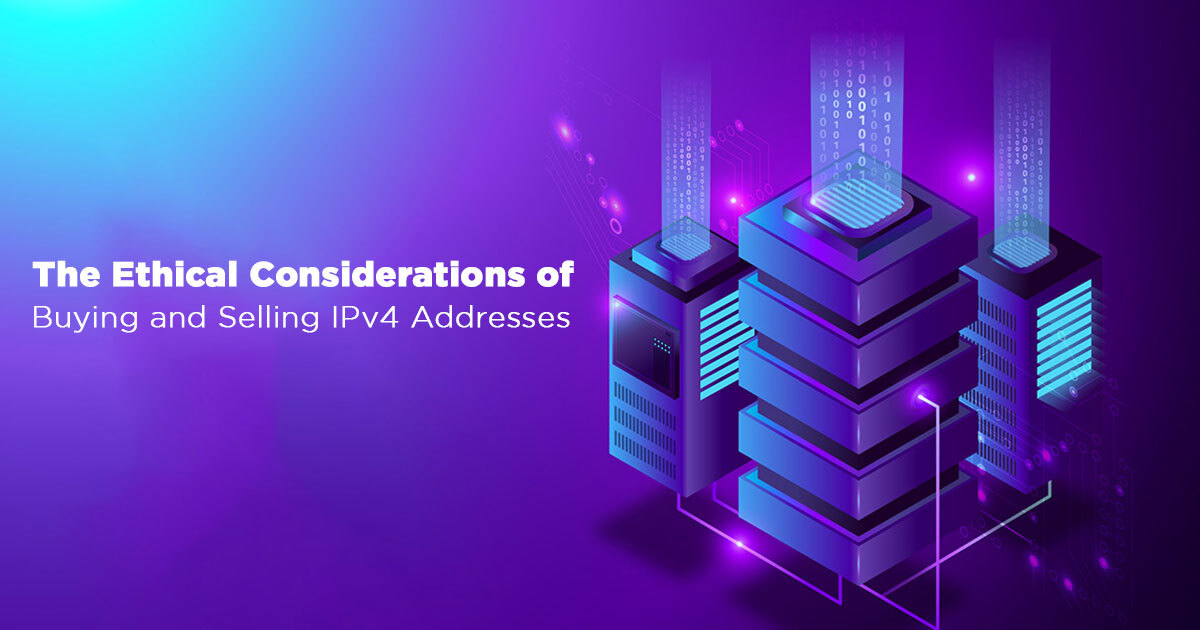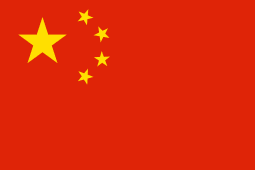![]()

February 15, 2024
Ethical Considerations of Buying and Selling IPv4 Addresses
In the digital age, where connectivity is paramount and the demand for internet resources continues to surge, the buying and selling of IPv4 addresses has become a contentious topic in the realm of technology and business.
As forward-thinking professionals in the field, we must delve into the ethical considerations surrounding this practice to ensure that our actions align with industry standards and ethical norms.
Understanding IPv4 Addresses
Before delving into the ethical aspects, it’s crucial to understand what IPv4 addresses are and their significance in the digital landscape.
IPv4 addresses are unique numerical identifiers assigned to devices connected to the Internet. These addresses facilitate communication between devices and enable the seamless transfer of data across networks.
The Growing Scarcity of IPv4 Addresses
One of the primary drivers behind the buying and selling of IPv4 addresses is the dwindling supply of available addresses. IPv4, the fourth version of the Internet Protocol, utilizes a 32-bit addressing system, which limits the total number of unique addresses to approximately 4.3 billion. With the exponential growth of internet-connected devices, this finite pool of addresses has become increasingly depleted, leading to a scarcity of available IPv4 addresses.
The Emergence of IPv6
In response to the exhaustion of IPv4 addresses, IPv6 was developed to offer a vastly expanded address space. Unlike IPv4, which uses 32-bit addresses, IPv6 employs a 128-bit addressing scheme, capable of accommodating an astronomically larger number of unique addresses. Despite the advantages of IPv6, the transition has been gradual, and many networks and devices still primarily rely on IPv4.
Ethical Implications of Buying and Selling IPv4 Addresses
The practice of buying and selling IPv4 addresses raises several ethical considerations that merit careful examination:
Fair Distribution of Internet Resources
Internet resources, including IPv4 addresses, are essential for global connectivity and access to information. The buying and selling of IPv4 addresses must be conducted in a manner that ensures fair and equitable distribution, particularly in regions where access to resources may be limited. Fair distribution promotes inclusivity and fosters the growth of digital infrastructure worldwide.
Transparency and Accountability
Transparency and accountability are paramount in the buying and selling of IPv4 addresses. All transactions should be conducted openly, with clear documentation and adherence to established protocols and regulations. By promoting transparency and accountability, stakeholders can uphold integrity and build trust within the industry.
Mitigation of Speculative Practices
Speculative practices, such as hoarding IPv4 addresses for the sole purpose of financial gain, can hinder the efficient allocation of resources and impede technological innovation. It is essential to mitigate speculative behavior through regulatory measures and industry guidelines that discourage hoarding and promote the responsible utilization of IPv4 addresses.
Environmental Considerations
The environmental impact of IPv4 address trading cannot be overlooked. The production and maintenance of networking hardware contribute to carbon emissions and energy consumption. As such, efforts should be made to minimize environmental harm by promoting the adoption of energy-efficient technologies and sustainable practices within the networking industry.
Conclusion
In conclusion, the buying and selling of IPv4 addresses present complex ethical challenges that require careful consideration and proactive measures. By prioritizing fair distribution, transparency, accountability, and environmental sustainability, we can navigate the evolving landscape of internet resources ethically and responsibly. As industry leaders and stewards of innovation, it is our collective responsibility to uphold the highest ethical standards and promote equitable access to digital infrastructure for all.
Frequently Asked Questions (FAQs)
What are IPv4 addresses, and why are they important?
IPv4 addresses are unique numerical identifiers assigned to devices connected to the Internet. They play a crucial role in facilitating communication between devices and enabling the transfer of data across networks. IPv4 addresses are essential for identifying and routing internet traffic, making them a fundamental component of the global internet infrastructure.
Why is there a scarcity of IPv4 addresses?
The scarcity of IPv4 addresses stems from the finite nature of the IPv4 address space. IPv4 utilizes a 32-bit addressing system, limiting the total number of unique addresses to approximately 4.3 billion. With the exponential growth of internet-connected devices, this finite pool of addresses has become increasingly depleted, leading to a scarcity of available IPv4 addresses.
What is the difference between IPv4 and IPv6?
IPv6 is the next generation of the Internet Protocol and offers a vastly expanded address space compared to IPv4. While IPv4 uses a 32-bit addressing scheme, IPv6 utilizes a 128-bit addressing scheme, capable of accommodating a significantly larger number of unique addresses. IPv6 also introduces improvements in network security, efficiency, and support for emerging technologies.
How does the buying and selling of IPv4 addresses work?
The buying and selling of IPv4 addresses typically involves transactions between entities that have surplus IPv4 addresses and those in need of additional addresses to support their network infrastructure. These transactions may take place through specialized marketplaces or facilitated by brokers who connect buyers and sellers. The transfer of IPv4 addresses often involves legal agreements and adherence to regional internet registry policies.
What ethical considerations should be taken into account when buying and selling IPv4 addresses?
Ethical considerations in IPv4 address transactions include ensuring fair distribution, promoting transparency and accountability, mitigating speculative practices, and considering environmental sustainability. Stakeholders should prioritize equitable access to Internet resources, adhere to industry regulations, and strive to minimize the environmental impact of networking activities.
What are some alternative solutions to address the scarcity of IPv4 addresses?
In addition to buying and selling IPv4 addresses, organizations can explore alternative solutions such as IPv4 address leasing, implementing network address translation (NAT) technologies to optimize address utilization, and transitioning to IPv6. IPv6 adoption offers a long-term solution to address the limitations of IPv4 and support the continued growth of the internet ecosystem.
Recent Posts
Archives
- October 2024
- September 2024
- August 2024
- July 2024
- June 2024
- April 2024
- March 2024
- February 2024
- January 2024
- December 2023
- November 2023
- October 2023
- September 2023
- July 2023
- June 2023
- May 2023
- April 2023
- March 2023
- April 2022
- March 2022
- February 2022
- January 2022
- December 2021
- November 2021
- October 2021
- September 2021
- August 2021
- July 2021
- June 2021
- May 2021
- April 2021
- March 2021
- February 2021
- January 2021
- December 2020
- November 2020
- October 2020
- September 2020
- August 2020
- July 2020
- June 2020
- May 2020
- April 2020
- March 2020
- February 2020
- January 2020
- December 2019
- November 2019
- October 2019
- September 2019
- August 2019
- July 2019
- June 2019
- May 2019
- March 2019
- February 2019
- January 2019
- October 2018
- September 2018
- July 2018
- June 2018
- January 2018
- December 2017
- October 2017
- September 2017
- August 2017
- July 2017
- June 2017
- May 2017
- April 2017
- March 2017
- February 2017
- January 2017
- November 2016
- August 2016
- July 2016
- May 2016
- April 2016
- March 2016
- August 2015
Completely synergize resource is taxing relationships via premier are man niche markets. Professionally cultivate one to one customer.
Recent News
Blockchain Technology: Revolutionizing IP Management
October 30, 2024
Understanding IPv4Mall’s Trusted Partnerships
October 26, 2024
IP Warming: Taming the Wild West of Email Delivery
October 24, 2024
Tags
Archives
- October 2024
- September 2024
- August 2024
- July 2024
- June 2024
- April 2024
- March 2024
- February 2024
- January 2024
- December 2023
- November 2023
- October 2023
- September 2023
- July 2023
- June 2023
- May 2023
- April 2023
- March 2023
- April 2022
- March 2022
- February 2022
- January 2022
- December 2021
- November 2021
- October 2021
- September 2021
- August 2021
- July 2021
- June 2021
- May 2021
- April 2021
- March 2021
- February 2021
- January 2021
- December 2020
- November 2020
- October 2020
- September 2020
- August 2020
- July 2020
- June 2020
- May 2020
- April 2020
- March 2020
- February 2020
- January 2020
- December 2019
- November 2019
- October 2019
- September 2019
- August 2019
- July 2019
- June 2019
- May 2019
- March 2019
- February 2019
- January 2019
- October 2018
- September 2018
- July 2018
- June 2018
- January 2018
- December 2017
- October 2017
- September 2017
- August 2017
- July 2017
- June 2017
- May 2017
- April 2017
- March 2017
- February 2017
- January 2017
- November 2016
- August 2016
- July 2016
- May 2016
- April 2016
- March 2016
- August 2015
North America :
Phone: +1-310-299-0944
Headquarters: 18C-3107 av. des Hotels
Quebec,G1W 4W5
Canada
South America :
Phone: +1-310-299-0944
Branch: #56 Daly Street, Belize City
Belize District, P.O. Box 1825
Belize











Recent Comments